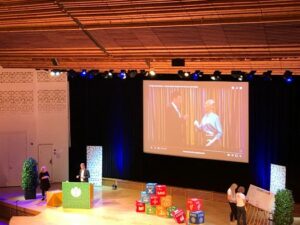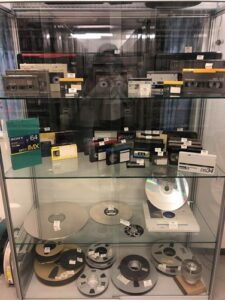By Angeliki Tzouganatou
In such times of covid-19, where the pandemic urges institutions around the world to push for their digital transformation, the inequalities in the digital economy of big data have been unveiled at last, calling for fairness and equity. Studying the conditions of openness of data while investigating the platforms´ ecosystems and business models, is timely and crucial (van Dijck 2020).
Reminiscing (physical) events
One of the things I have missed the most in research over the course of the pandemic, is participating physically in conferences, symposia and related events. I believe there is a different dynamic when participating in the physical realm, than in the digital, although events taking place online could be more accessible for participation, in terms of lower fees and/or because no travelling is required. Firstly, my perspective on my research topic had been influenced by two conferences attended last year, the Wikimania 2019 and MyData 2019, taken place in August and September 2019 respectively.
The Wikimania conference, held in Stockholm, as its name yields, is the official annual conference of Wikimania Foundation. There, I had the chance to delve more into the logic of Wikimedia Foundation and their subprojects, meet passionate Wikimedians and have fruitful exchanges as well. Especially, it was very interesting for me to learn more about the Wikimedia Commnons platform, its potentialities for opening up knowledge and public participation. Also, on the occasion of the conference, discussions were held on the role of free knowledge in advancing the United Nations Sustainable Development Goals (SDGs) (Figure 1). This in particular, helped me to further consider the significance of open knowledge in challenging contemporary issues.

Figure 1: Keynote talk by Michael Peter Edson, co-founder and Associate Director of The Museum for the United Nations — UN Live (Photo: Angeliki Tzouganatou).
On the other hand, the MyData conference, took place in Helsinki. MyData is a Finnish-led initiative building and advocating for a fair and human-centered personal data management and processing model in the data economy. There, I was able to further explore the digital platforms´ ecosystem and gain a better, more comprehensive understanding, of how the digital economy is currently operating, while reflecting on their challenges and pitfalls. The main take away lesson for me, is that technology alone will not save us and shouldn´t be at the centre, rather, we need human-centred approaches in the digital ecosystem.
Moreover, on January 2020 I got invited to participate at the Leibniz Institute for Research on Society and Space (IRS) seminar titled “Spaces of Emergence – Emergent Spaces” in Berlin, where the focus of discussions was around platform ecologies. There, I shared some thoughts on the topic of “Opening up platform economy for accessible digital heritage knowledge” and helped me particularly to get a more comprehensive understanding of platform economics.
Secondment in Open Knowledge Finland
Being part of a Marie-Curie ITN research project, I was privileged enough to receive the opportunity of spending almost a month conducting research work in Helsinki, Finland. I used my secondment opportunity as a great occasion to collect research data for my PhD, and get actively involved in discussions and events around current and emerging topics around openness in the digital economy of big data.
During the fieldwork I was able to immerse myself in a sense, in the Finnish open knowledge and openGLAM (Galleries, Libraries, Archives & Museums) scene, being able to meet and speak with some incredible people that are experts in their field. Their expertise was varying, as my aim was to collect a wide range of experts covering key aspects of the whole spectrum of the internet ecosystem while at the same time reflecting its fluidity.
I conducted 15 in-depth interviews with openGLAM activists, social innovators, senior legal counsellors, university professors and researchers, as well as with service designers. I was lucky enough to visit and see how some of the great Finnish Institutions operate from the inside, including the Finnish National Gallery, the Helsinki City Museum, the Aalto Archives, the Aalto University, the National Library of Finland, YLE-Finland’s national public broadcasting company (Fig. 2), and the University of Helsinki. The time spent during my secondment played a crucial role on how my research thinking was informed and had a profound impact on my approach and understanding of these emerging phenomena.

Figure 2: YLE archive (Photo: Angeliki Tzouganatou).
Current status of research
Throughout the past year, I have been critically reflecting on the current notions of openness in the digital condition, and I have also realized the ethical issues that are inherently entangled when talking about opening up knowledge. This is a crucial point, that the interested parties should take into serious consideration. Yet, it is often underestimated, as openness from one side is frequently conceived as panacea. Also, I am looking critically on the ideology of the concept of openness as it has been adopted by the openness business model, namely profiting from free, and what are its pitfalls (Lund and Zukerfeld 2020)
Furthermore, I am studying through cultural data and platforms, investigating from a macro-level the economic and legal issues that are perplexed in the digital ecosystem. I am particularly attentive to the ecologies that are capable of encouraging open knowledge and participation. However, in the attention economy, platform monopolies have been formed which are monetizing users´ data –actions, preferences, emotions- (Jordan 2020), in the era of platform capitalism (Srnicek 2017). From my PhD preliminary findings, it is quite evident that we need to shift from monopolies of knowledge to fairer models that are human-centered.
My research perspective has taken a more critical stance to digital technologies, and is being informed predominantly by critical perspectives on digital media technologies. As a result my research critically considers: how is cognitive capitalism (Moulier Boutang 2012) affecting knowledge production and distribution online?
Currently, I am in the process of analysing the collected data. In total I have conducted in-depth interviews with 18 people, where the 15 of them during my secondment. After the transcription of the interviews, I code them with MAXQDA, a software for qualitative data analysis, and implementing Grounded Theory.
Future possibilities and next steps
Moreover, for the next steps of my research work, I am planning to conduct a co-creation workshop with interview participants. The workshop´s aim is “to give back to the community”, discuss the results derived from my current research and principally attempt to develop a formative evaluation of the results. This aims to aid to the co-creative and participatory aspect of the models´ design that would be proposed by the end of the project. The involvement of the public´s participation in the design of the new models, is considered to be a crucial stage, offering co-designing and co-creation opportunities implementing a bottom up approach.
Furthermore, I will conduct a block seminar during the Winter Semester 2020 at the Institute of Empirical Cultural Studies at the University of Hamburg, entitled “Critical approaches to digital culture: towards open and fair ecologies”, where I am planning to further explore and reflect on the above mentioned topics.
Angeliki Tzouganatou is a POEM fellow based at the Institute of Empirical Cultural Studies at the University of Hamburg. Her research interests is all about digital heritage, openness, platform ecologies and economics. She can be reached at angeliki.tzouganatou@uni-hamburg.de. Follow her on Twitter @antzouganatou.
Publication bibliography
Jordan, Tim (2020): The digital economy. Cambridge, Medford, MA: Polity.
Lund, Arwid; Zukerfeld, Mariano (2020): Corporate Capitalism’s Use of Openness. Cham: Springer International Publishing.
Srnicek, Nick (2017): Platform capitalism. Cambridge, UK, Malden, MA: Polity (Theory redux). Available online at http://search.ebscohost.com/login.aspx?direct=true&scope=site&db=nlebk&AN=1444285.
van Dijck, José (2020): Governing digital societies: Private platforms, public values. In Computer Law & Security Review 36, p. 105377. DOI: 10.1016/j.clsr.2019.105377.

